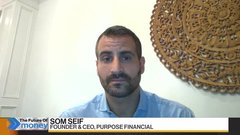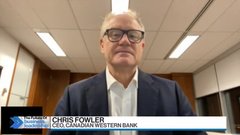Oct 8, 2017
'Better than humans': Vanguards of the AI arms race
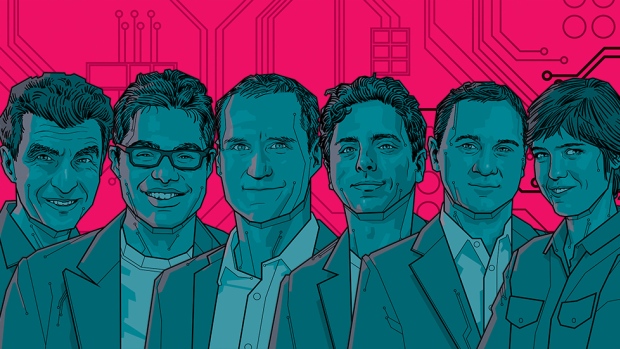
he artificial intelligence revolution has arrived, setting in motion the most powerful technological transformation of our lifetime.
“AI is going to be more impactful than the invention of the personal computer and the spread of mobile phones into your pocket,” AI expert and Google Senior Fellow Jeff Dean told a TEDx Los Angeles crowd last December.
So-called machine learning – where computers find their own insights without being directly programmed to do so – is set to fundamentally change the relationship between humans and robots. A reality that is both exhilarating and terrifying.
As millions ponder whether AI will replace their jobs, Tesla CEO Elon Musk is warning AI could cause World War III, responding to Russian President Vladimir Putin’s comment that AI’s eventual leader “will become the ruler of the world.”
Against that backdrop, an AI arms race has been triggered between tech Goliaths such as Apple, Amazon and Google.
McKinsey Global Institute, a leading think tank, estimates the tech giants invested as much as US$30 billion in artificial intelligence last year in a combination of R&D spending and startup acquisitions. McKinsey estimates venture capitalists and private equity investors plowed another US$9 billion into AI startups, particularly those focused on machine learning.
For venture capitalists – writing big cheques to fuel a fast growing army of unproven artificial intelligence startups – the potential rewards are astronomical. But the challenge for investors will be to identify truly transformational AI companies, while avoiding the fool's gold. Here's a look at the vanguards of tech’s new revolution.

Illustrations by Mike Faille, special to BNN
Google’s pace of acquisitions highlights how quickly the company’s focus shifted to AI, despite initial skepticism from co-founder Sergey Brin.
“Having been trained as a computer scientist in the 90s, everybody knew that AI didn’t work,” Brin told a crowd at the World Economic Forum in Davos this past January. “When I was heading up Google X a few years back, one little project we had in there called Google Brain – I didn’t pay attention to it all, to be perfectly honest.”
Google’s secretive X lab (previously known as Google X) has served as the birthplace for many of the company’s moonshot ideas, from Google Glass to its self-driving car unit, Waymo. In the case of Google Brain, Andrew Ng, an AI academic from Stanford, played a key role in getting the project off the ground.
“One of my then-students, Adam Coates, had determined that the bigger you build a neuro network, the better it performs. I wanted to find someone with a lot of computers so I could use to build really big neuro networks,” Ng told BNN in a television interview.
“I looked around Silicon Valley and I said, well, Google has a lot of computers. So I got together with my friend Sebastian Thrun, whose office was right next to me at Stanford, and we started pitching this to Google. I remember this culminated in Sebastian, Google Co-Founder Larry Page and me having dinner.”
In one 2012 experiment, the Google Brain team built a neural network of thousands of computer processors, hoping it could then recognize objects in YouTube video thumbnail images. After feeding the network millions of images, one of the objects the system learnt to recognize was a cat.
“Our Senior Fellow Jeff Dean would periodically come up to me and say, ‘Look -- the computer made a picture of a cat!’ And I would say okay that’s very nice Jeff…do your thing, whatever,” Brin recalled during his World Economic Forum interview in January.
But by 2017, AI had gone from ignored sideshow to the central focus at Google’s developers’ conference.
“Computing is evolving again,” Google CEO Sundar Pichai told attendees in May.
“Mobile made us reimagine every product we were working on. We had to take into account that the user interaction model had fundamentally changed,” he added. “Similarly, in an AI-first world, we are rethinking all of our products and applying machine learning and AI to solve user problems.”
Pichai walked developers through concrete examples of how machine learning is being rolled into virtually every Google product -- from search and Gmail to Google Maps and Google Assistant.
“Our computer vision systems now, for the task of image recognition, are even better than humans. It is astounding progress,” Pichai told the crowd.
And, as Sergey Brin told the Davos crowd back in January, few have been more astounded than him.
“This revolution in deep nets has been very profound and definitely surprised me, even though I was right in there.
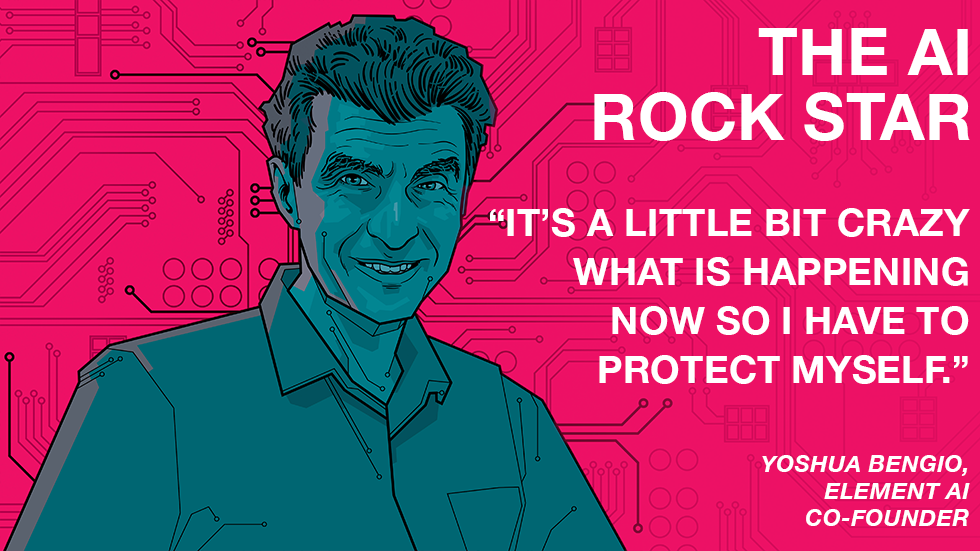
Google’s growing obsession with artificial intelligence has quickly raised the profile of industry pioneers like Yoshua Bengio, a recent Order of Canada recipient whose Montreal-based startup Element AI raised a record amount of artificial intelligence funding.
After spending years researching AI far from the limelight, the mild-mannered University of Montreal professor now enjoys rock star-like status in tech circles. Others enjoying such status include NYU’s Yann LeCun, who also leads AI research for Facebook; and Geoffrey Hinton, the 69-year old British-born University of Toronto professor who joined Google after it acquired his AI startup, DNNresearch.
“Deep learning started at a time when neural networks – which is what is behind deep learning – was really not popular,” Bengio, who co-founded Element in 2016, told BNN during a May television interview.
“A decade ago, it was hard to attract students, not to mention journalists or industry. We were just focused on the science, really – trying to fulfill our vision of how to build intelligent machines. And now, in the last few years, it’s completely upside down.”
While Bengio has been serving as an advisor to Microsoft, he was less inclined to join a big tech company on a full-time basis, which led to the launch of Element.
Initially billed as an incubator for artificial intelligence startups, Element is leveraging Bengio’s network of AI researchers, by building a platform to connect them with big companies in need of AI tools, the same way consumers buy specialized apps from Apple’s App Store.
In June, Element raised US$102 million, an amount it claimed was the largest Series A funding for an AI startup in history. Element’s backers include VC firm Data Collective, which is betting heavily on AI startups; as well as Microsoft, Nvidia, and Intel.
Element’s success may depend on how many companies believe they need its eventual suite of AI offerings. A recent survey by the McKinsey Global Institute found many executives are uncertain about how AI would ultimately help their business, with concerns are about how to integrate AI into their companies and how to measure their return on investment.
Bengio will need to tackle those questions, while juggling a busy schedule. Along with his work at the Université de Montréal, he helps lead the Montreal Institute for Learning Algorithms, an AI lab with government funding and assistance from deep-pocketed players like Google.
“It’s a little bit crazy what is happening now so I have to protect myself,” Bengio told BNN.
“I have to make sure I continue to focus on the things I really care about, which is my research, brainstorming with my students, having time to think and be creative. Otherwise, the meaning of my life might be gone.”
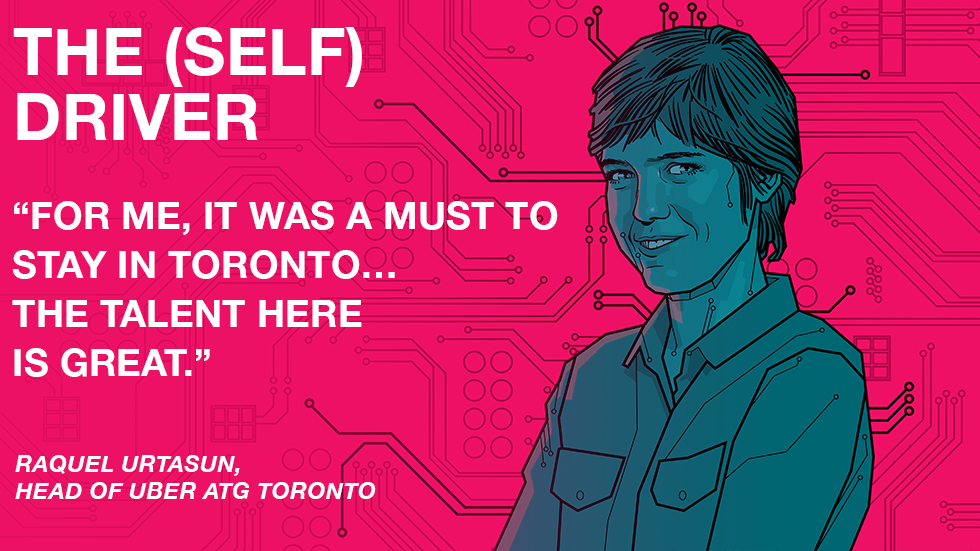
Self-driving cars are at the centre of one of the fiercest talent battles in artificial intelligence, with the likes of Uber aggressively targeting AI superstars. In May, the ride-hailing company landed Raquel Urtasun, a fast talking professor at the University of Toronto.
“Self-driving is going to change the way we live,” Urtasun told BNN in a phone interview. “We can lower the risk of accidents, provide mobility to people who don’t have it now, reduce pollution and the cost of transportation.”
A fan of computers and video games from an early age, Urtasun grew up in Pamplona, Spain. “It’s very famous for the running of the bulls. But not really for AI,” she said.
When a knee injury sidelined her university basketball career, Urtasun turned her full attention to science.
For 13 years, she has worked on machine learning at leading institutions, including MIT and Berkeley. Uber was keenly interested in her work on software enabling self-driving cars to recognizing objects.
“After researching self-driving cars for seven years, I hit the maximum impact I could within the academic world. I wanted to go to the next level, where the work I do would not only influence academics, but also impact the way that we live.”
With AI research talent hotter than free agent athletes in professional sports, Urtasun had plenty of suitors to pick from. At Uber she negotiated the creation of a driverless car research lab in Toronto – the company’s first research hub outside the United States.
“For me, it was a must to stay in Toronto,” said Urtasun, who is now wearing two hats as a professor and an Uber employee.
“I didn’t want to go to the Valley or anywhere else. The talent here is great. So Uber was definitely not shy to make a big commitment to Toronto.”
Uber’s bet on Urtasun comes as it battles Waymo, Google’s self-driving car project, over one of its previous AI talent grabs.
In August 2016, Uber acquired self-driving truck startup Otto for a reported US$680 million. Otto’s co-founder, Anthony Levandowski had worked on Google’s self-driving car team. Waymo claims he downloaded more than 14,000 confidential files before leaving Google to launch Otto. Uber has denied using any of Google’s trade secrets. Levandowski was fired by Uber in May.
Despite Uber’s high-profile headaches, Urtasun believes the company will play a key role in solving some of the many unknowns surrounding self-driving vehicles, including how to best incorporate mapping technology with road conditions constantly changing. “Mapping is super expensive in self-driving cars. Finding out these solutions is the major challenge right now.”
Urtasun also sees an opportunity as a leading female voice in a male-dominated AI world, where some wonder if gender bias will play a role in machine learning. “There are very few women in tech and I hope my success will help improve the number of women who are in leadership positions.”
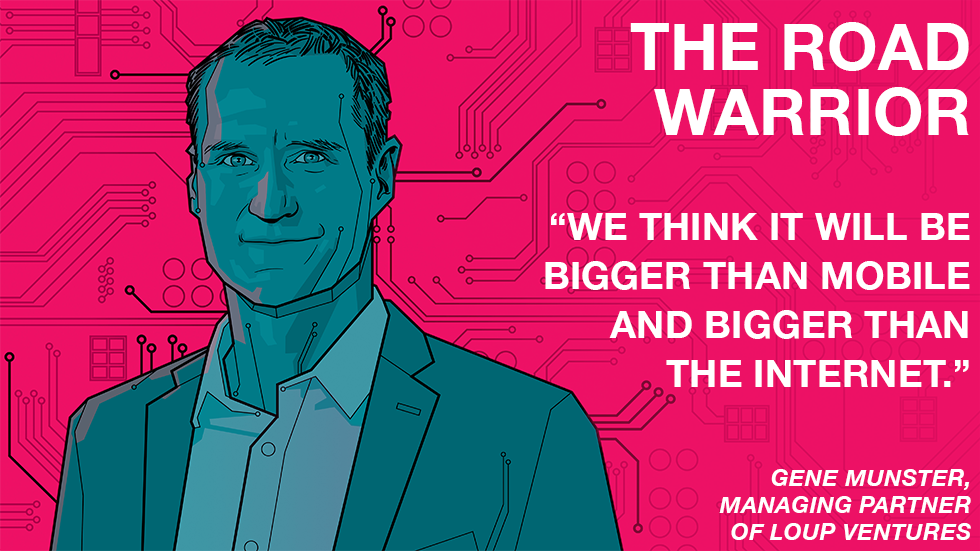
With so much artificial intelligence talent located on college campuses, ambitious AI venture capitalists like Gene Munster are reaching out to university research labs, in search of startups.
“We call it dialing for deans,” Munster, Managing Partner of Loup Ventures, told BNN in a phone interview, of his strategy of outflanking his competitors.
Munster has been traveling to lesser known tech hubs in cities like Toronto, Denver, Pittsburgh, Brooklyn, Ann Arbor and Memphis.
“A lot of great ideas initially start outside Silicon Valley,” Munster said. “It's not worth the time for VCs based in the Valley to fly around meeting these five-person companies, so that leaves an opportunity for us to find them early.”
Munster co-founded Minneapolis-based Loup last December, after spending two decades as a technology analyst for the investment firm Piper Jaffray. His “aha” moment came in the fall of 2015, during a routine, whirlwind trip to Silicon Valley for investor meetings.
“I was meeting with contacts who were close to Google,” Munster told BNN in a phone interview. “It was pretty clear Google was seeing a shift in AI and had a growing interest in being an advocate for really taking this theme to the next level.”
Munster sat in a meeting room, as a group of startup investors walked him through Google’s internal views on AI, explaining how artificial intelligence would have a measurable impact on businesses in the next decade. “These investors were putting their money behind it.”
Munster notes Apple, which has acquired at least eight AI startups in the past three years, quickly followed suit. “When Google and Apple start getting behind things, that can will an industry into existence.”
While Munster typically spends one week each month in the Valley, he says not being based there has its advantages.
“We’re not in the echo chamber, which can lead to more clear thinking.”
Loup is on pace to look at one thousand early-stage robotics, virtual reality, and AI startup investments this year. In the end, it will invest in a dozen at most.
“We’re not trying to hit the jackpot in the next two years. This wave is going to take five years to become obvious, so we have to be systematic.”
For Munster, launching his own business investing in unproven companies comes with its fair share of tense moments. “We’re not getting paid right now,” he said. “I’m not taking salary on our first investment fund. And I might not get paid for five years. That’s really scary.”
“But the part makes me okay with that risk is that I believe so strongly in this next wave. We think it will be bigger than mobile and bigger than the internet.”
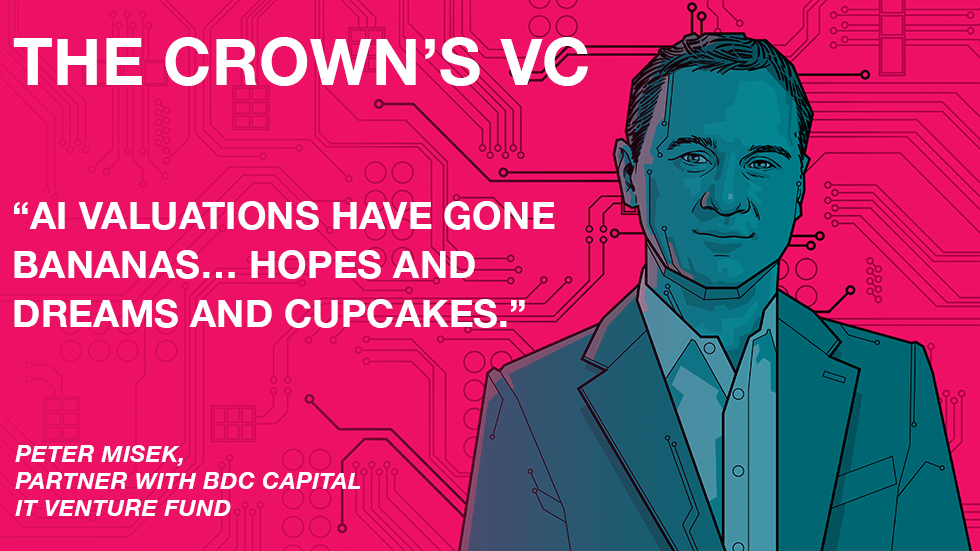
In Canada, artificial intelligence has been equally enticing to Peter Misek, another former equity analyst turned venture capitalist.
Misek, a self-described hobby programmer, is placing calculated AI investment bets, as a partner with the BDC Capital IT Venture Fund, which currently manages $300 million. BDC Capital is a subsidiary of the Business Development Bank of Canada, a Crown corporation.
Misek estimates between five hundred and one thousand software startups are launching this year in the Greater Toronto Area, with many of those companies focusing on AI.
“The pioneering work that AI leaders like the University of Toronto’s Geoffrey Hinton (who now works with Google) have done has helped put Canada on the map. That’s why Canada has a shot in AI.”
And yet, Misek questions the longevity of some of the current crop of startups receiving funding. He says the vast majority of investor presentations that come across his desk are from AI startups that have no revenue.
“Artificial Intelligence valuations have gone bananas,” he said during a BNN television interview in May. “We’re seeing companies with no software product to sell being valued at crazy multiples. They’re selling a dream…hopes and dreams and cupcakes.”
Misek says he’s been approached by more than one thousand startups in the past twelve months. Of those, his team has looked closely at 15 companies and ultimately invested in two of them, following some heavily data driven analysis.
“You’ve got to look at the code base, and send it to a lab. You need to see how much is unique and original. And is it going to run out of capabilities in a year?”
He’s also concerned that building sustainable businesses could become increasingly more challenging as companies like Facebook, Google, and Amazon release more AI open source code, enabling machine learning or, what he calls “weak AI,” out of the box.
“Right now, both the giants and startups are struggling to find ways to differentiate and create value because it’s moving so fast and commoditizing…they just don’t know what to do.”
Misek can afford to be choosy in his search for startups that can grow big enough to raise public funds.
“In order for my fund to work, I have to back several billion-dollar companies, which down the road, can be ‘IPOable,’” Misek said, using his short form for going public.
“Can global billion-dollar businesses be built? The answer remains to be seen.”
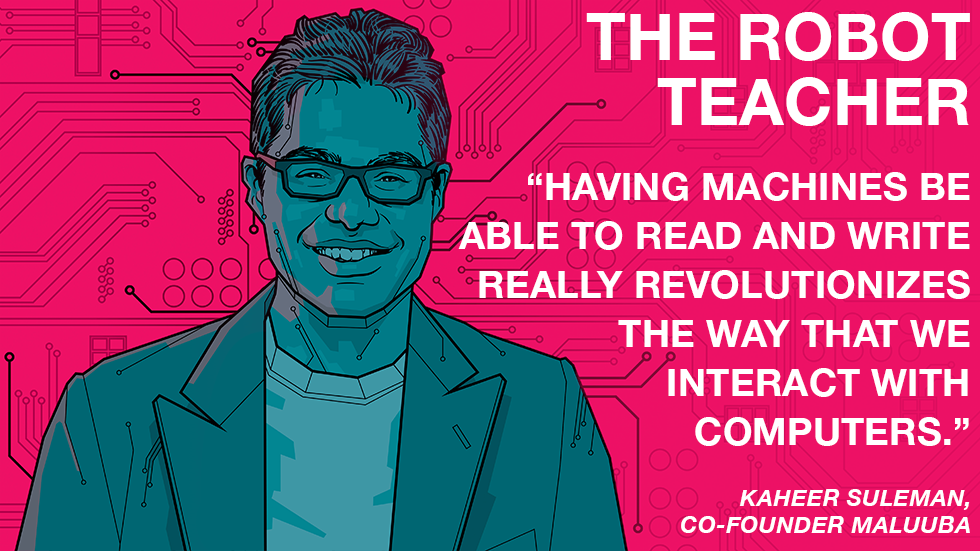
While some AI startups will face pressure to build lasting businesses, others will simply be swallowed up by tech companies, hungry for talent. Between 2013 and 2016, the number of AI-related acquisitions rose at an annual rate of more than 80 per cent, according to the McKinsey Global Institute.
For one of those founders, Kaheer Suleman, who sold his AI startup Maluuba to Microsoft this past January, the appeal of being acquired by a big tech company had everything to do with scale.
"We were really thinking about how we can make the biggest impact with our technology," Suleman told BNN in a television interview in March. "Text is really a cornerstone of all of Microsoft’s products. And our goal is to make all machines literate. So joining up with them just made perfect sense.”
For Microsoft, which has acquired at least a half dozen AI startups in the past three years, startups like Maluuba help the company beef up in areas like speech and image recognition, which have been top AI priorities.
Suleman founded Maluuba in 2011 with Sam Pasupalak while both were undergrad students at the University of Waterloo.
Initially seen as a potential alternative to Apple's Siri, Maluuba quickly developed a reputation for its work in teaching machines to learn through language. In 2015, Maluuba set up an AI lab in Montreal.
“I think having machines be able to read and write really revolutionizes the way that we interact with computers. No longer do we have to rely on learning commands or these complex metaphors that people have put together to try to make it easier,” said Suleman. “You can imagine this type of technology across all types of industries – whether it’s medical, legal, or research.”
THE ROAD AHEAD
With each passing day, the rise of AI brings scenes from science fiction films to life. And while tech visionary Elon Musk warned about the potential dark side of AI, many in Silicon Valley are striking a more upbeat tone.
Take Facebook CEO Mark Zuckerberg, for example.
Responding to a viewer question about Musk’s concerns during a Facebook Live Q&A, Zuckerberg said in July, “I think you can build things and the world gets better, and with AI especially, I’m really optimistic. I think people who are naysayers and try to drum up these doomsday scenarios are – I just, I don't understand it. It's really negative and in some ways I think it is pretty irresponsible.”
Amazon’s Jeff Bezos, meanwhile, singled out machine learning and artificial intelligence in his annual letter to shareholders, noting those who ignore big trends like AI are doing so at their own peril. “If you fight them, you’re probably fighting the future. Embrace them and you have a tailwind,” he wrote.
Caveat emptor: Amazon and Facebook are aggressive participants in the AI arms race, both seeking to stockpile talent. In all, leading tech companies and manufacturers have completed more than 100 AI startup acquisitions since 2010 – with Facebook, Microsoft, Amazon, IBM, Twitter, Uber, Intel, Oracle, Salesforce and eBay collectively acquiring at least 30 startups in the past three years.
Against that backdrop, it’s no surprise to see the gold rush-like spirit fueling so many AI startups.
"I am telling you, the world's first trillionaires are going to come from somebody who masters AI and all its derivatives and applies it in ways we never thought of," billionaire entrepreneur Mark Cuban told a crowd at the South by Southwest festival in April.
And while it’s too early to say who the biggest AI winners will be, it is clear untold riches are up for grabs.




